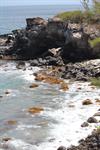Tourism Impacts
The Impact of Tourism on Wilderness Areas
 Very few tourist activities benefit natural environments; almost all natural environments are better off without tourists. It has been said that adventure tourism has created a positive impact on the environment having given it a monetary value and a financial incentive for conservation. In some cases, this is true. One thing that has come out of adventure tourism is a more heightened awareness of the problems causing environmental damage today as people are face to face with this damage and can see it with their own eyes. With a more educational approach to adventure tourism more people will be aware of the damage caused to these precious environments. However, the consequences of tourism in natural environments includes erosion, deforestation, pollution in all its forms (contamination of waterways, litter, landfills, noise pollution, visual pollution etc.), disruption of animal breeding and feeding patterns, and loss of biodiversity. It is difficult to disagree that the impact of adventure tourism on the natural world is clearly negative.
Very few tourist activities benefit natural environments; almost all natural environments are better off without tourists. It has been said that adventure tourism has created a positive impact on the environment having given it a monetary value and a financial incentive for conservation. In some cases, this is true. One thing that has come out of adventure tourism is a more heightened awareness of the problems causing environmental damage today as people are face to face with this damage and can see it with their own eyes. With a more educational approach to adventure tourism more people will be aware of the damage caused to these precious environments. However, the consequences of tourism in natural environments includes erosion, deforestation, pollution in all its forms (contamination of waterways, litter, landfills, noise pollution, visual pollution etc.), disruption of animal breeding and feeding patterns, and loss of biodiversity. It is difficult to disagree that the impact of adventure tourism on the natural world is clearly negative.
Some strategies for reducing negative impacts are making paths to minimise damage to fragile ecosystems, using overhead or tree-top facilities and/or walkways, and public education and awareness campaigns. The use of urban based or artificial adventure tourism sites is beneficial and reduces environmental impact as these methods are relatively low impact and the environments are much more resilient.
Many operators are turning to ecotourism as a sustainable, minimal-impact approach to adventure tourism. At best this offers a way for people to learn about the environment and perhaps even an opportunity to participate in conservation programs that will enhance the environment. But some ecotourist facilities are simply a way to harness tourist dollars, offering tourists a guilt-free holiday because they use such things as ‘green’ (biodegradable) shampoos and re-use their bath towels instead of putting them out for a daily launder.
Economic Impacts
Undeniably tourism brings prosperity to communities and regions. Employment in the tourism industry not only brings direct economic benefits to individuals, it has flow-on effects to the entire community. An established tourist destination has shops, medical services, transport and recreation facilities – which are obviously beneficial for all concerned.
There are many positive impacts of adventure tourism to a local economy: injection of money into the local economy, job creation, opportunities for development of enterprises and family businesses, and in exceptional cases the development of facilities such as schools and medical services. However, with positives come the negatives such as seasonality of work, the facilities not being available for other issues such as health and education and having the economy become reliant on adventure tourism to the disadvantage of other economic sources.
In some tourist areas the local community receives minimal benefit. For example, some foreign-owned island resorts in developing countries have the problem of ‘leakages’. Tourists spend all their time and money in the one location which is owned by wealthy foreigners. The tourist dollars ‘leak’ out of the host country, without the residents receiving any great benefit.
Another problem is that in some developing countries, infrastructure and development in tourist destinations such as roads, airports and shopping centres is geared towards the affluent tourists who can afford to use these facilities. There is minimal investment in other facilities such as schools and hospitals which would benefit the local community.
Some economies in developing countries become over dependent on tourism at the expense of investment in other areas of employment. Tourism tends to create lots of low-paid jobs, many of which are only available during the high season. When seasonal work is readily available, there is less incentive for the community to invest in other, longer-term, employment sectors, such as farming, education and industry.
How to Learn More about Tourism
There are many facets to the tourism industry, and sectors within the industry, such as Ecotourism are experiencing rapid rates of growth. There are many different areas of careers and employment within the Ecotourism industry - from tour guides to management.
ACS offers a great range of distance learning courses in tourism and ecotourism, as well as a variety of environmental and conservation courses. If you have an interest in developing your knowledge for a career in Ecotourism take a look at the courses listed in the directories (below) or get in touch with one of our specialist Hospitality and Tourism tutors today. They will be pleased to discuss your study aims, and course options available to you.
[20/01/2026 13:07:30]
More from ACS
Short courses, certificates and diplomas -lots of home study options.